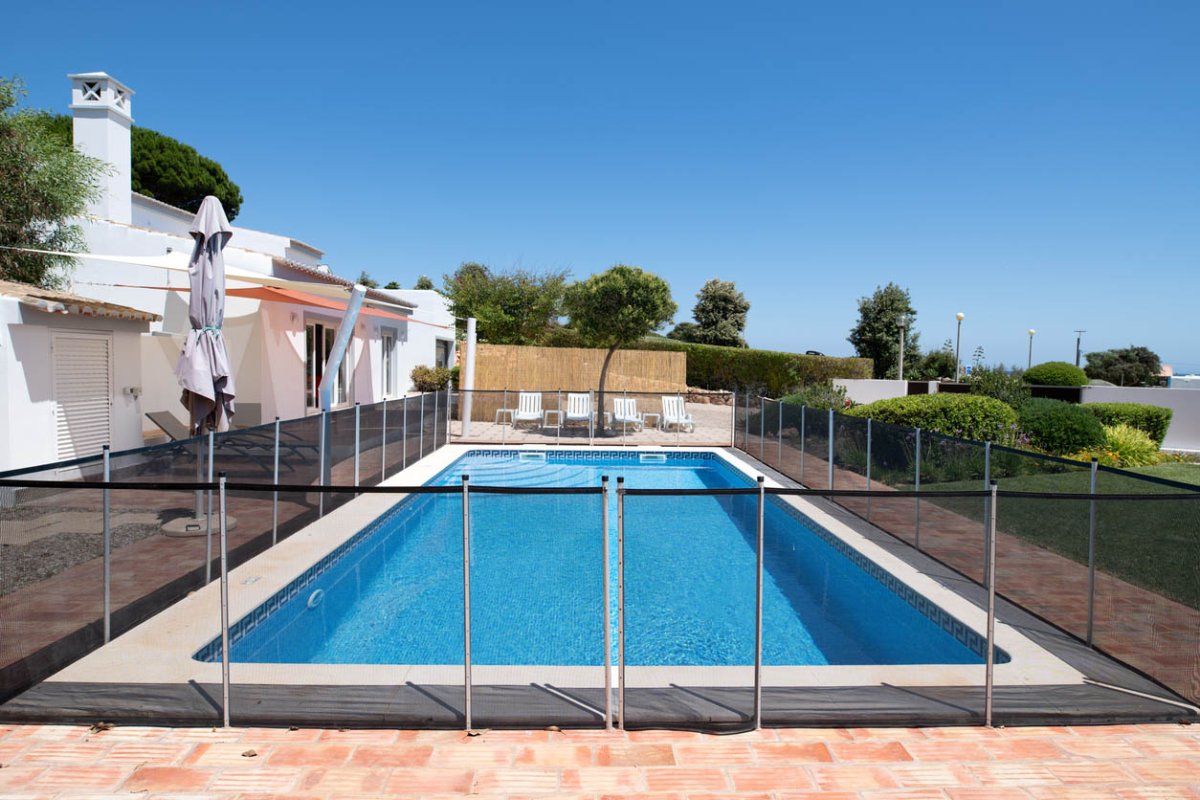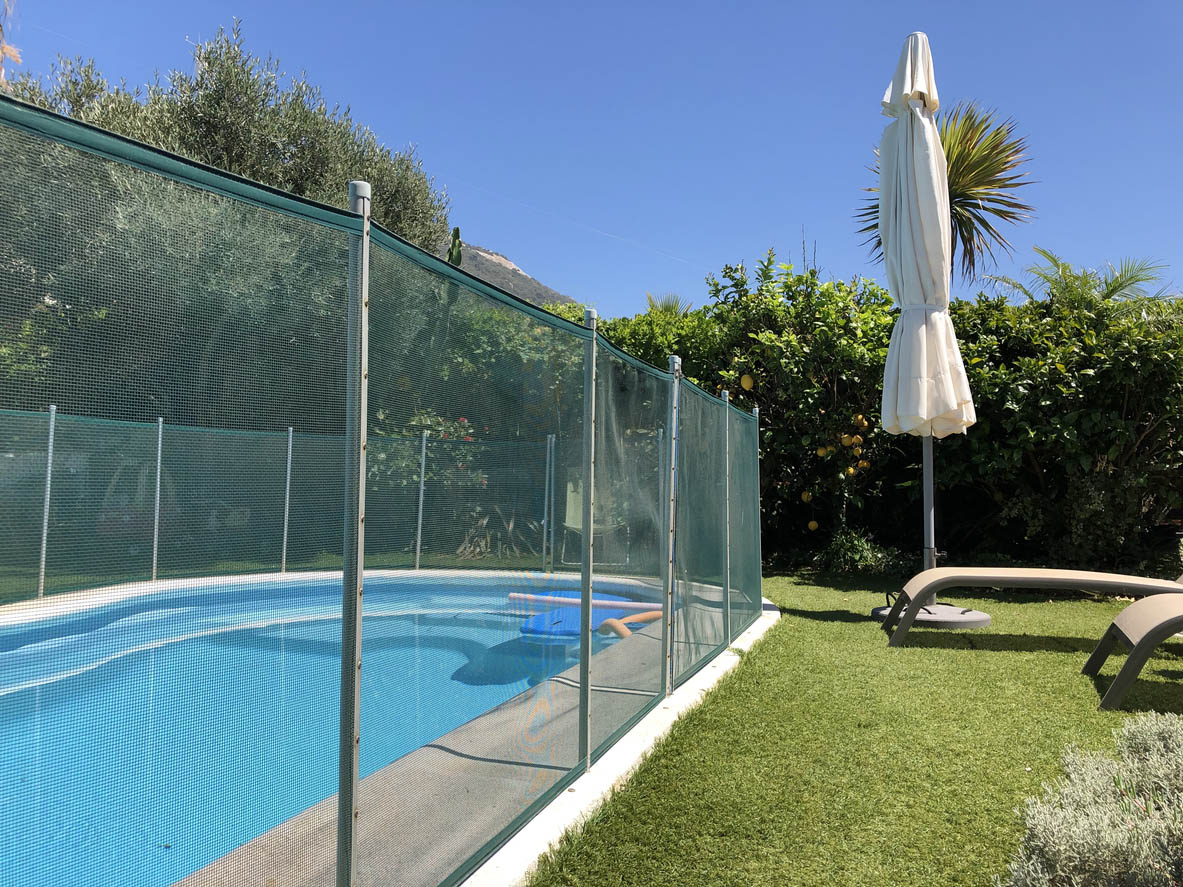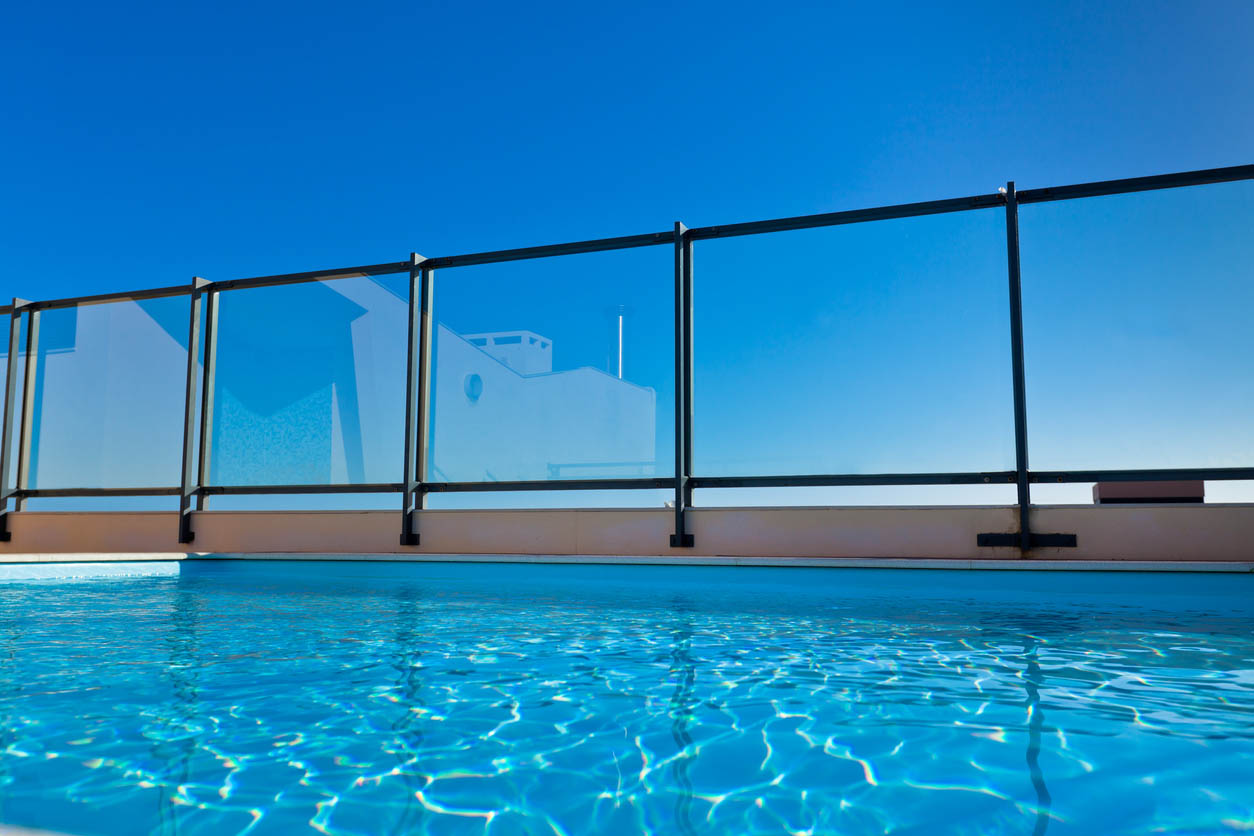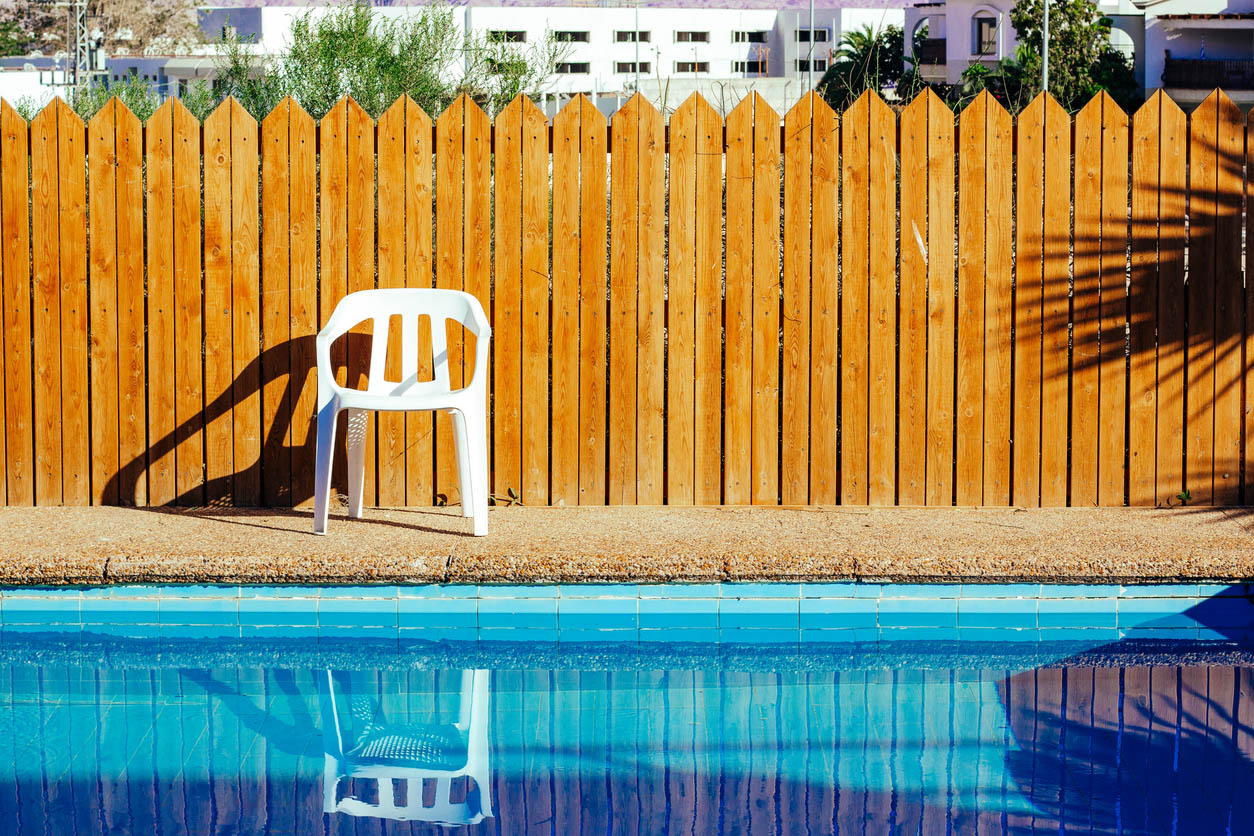

We may earn revenue from the products available on this page and participate in affiliate programs. Learn More ›
Highlights
- The typical cost to build a pool fence ranges between $1,500 and $10,000, with a national average cost of $6,500.
- The main factors affecting pool fence costs include the size and shape of the pool, the type of pool, the material and height of the fence, the brand and type of fence, the type of gate, the cost of labor, and the home’s terrain and geographic location.
- A pool fence provides safety and privacy to a backyard pool, and may also be required by local regulations to reduce the homeowner’s liability.
- A homeowner may be able to install a basic pool fence themselves, but hiring a professional can help ensure the fence is installed properly and safely.
If you’re enjoying leisurely afternoons at your backyard pool, consider adding a swimming pool fence. Some areas actually require inground pools to be fenced for safety reasons, but pool fences can also add a measure of privacy if built high enough. But how much does a pool fence cost? According to HomeAdvisor and Angi, there’s a wide range of costs from $1,500 to $10,000, though most homeowners will pay $6,500 on average.
These costs vary since pools come in all shapes and sizes—not to mention there are several options for materials, fence height, and gates. Pool fence cost is also influenced by any local requirements and current labor rates. Read on to learn all about what makes up the cost of a pool fence.
Key Cost Factors
The size, shape, and height of the fence will significantly impact the cost of your pool fence since prices increase with every extra linear foot. Prices are also different for inground and above-ground pools. When budgeting for pool fence costs, take into consideration these factors and others.
Pool Size and Shape
Naturally, larger pools will need a larger fence, and that increased size means a higher cost. The cost of a pool fence per foot is $15 to $25. So a pool fence could cost $2,000 for 100 linear feet, while 300 linear feet could cost around $6,000.
The shape of the pool will also affect the cost. Many pools are a standard rectangle shape, which is ideal for building a fence. However, a pool with curved edges could cost more if you choose to have the fence follow the pool shape.
Pool Type
Most pool fences are built around inground pools to prevent children, pets, and even adults from accidentally falling into the pool. The barrier height for inground pools is usually 4 or 5 feet, but local regulations often dictate this height. Most pool companies will quote homeowners for a 4-foot fence unless otherwise stated.
Above-ground pools don’t carry the same risk as inground pools, so the fences are built a little lower: usually 2 to 3 feet high. Again, local regulations can differ. With a lower height, the overall pool fence cost will be lower. These fences act more like a guardrail to the pool and can be freestanding or attached to the pool or deck.
Fence Material and Height
Materials are another big player in what makes up pool fence cost. Pool fences can be budget-friendly or glamorous, from chain link to vinyl to glass. The lowest average cost per foot is $5 to $12 for chain link, but glass fences could cost $100 to $600 per foot. A pool fence cost calculator could help estimate the total price you’ll pay depending on the material.
The higher the fence, the higher the cost since more materials are needed. As mentioned, inground pool fences are usually 4 to 5 feet, while above-ground pool fences only stand 2 to 3 feet high. In general, privacy fences cost more than other types of fences due to their height.
Fence Brand
As with most products, the pool fence brand can influence the cost. Some of the most common pool fence brands include the following.
| Fence Brand | Average Cost per Square Foot (Materials and Labor) |
| All-Safe | $15 to $30 |
| Guardian | $15 to $25 |
| Katchakid | $11 to $19 |
| Life Saver | $16 to $30 |
| Protect-a-Child | $10 to $26 |
Labor and Geographic Location
Labor makes up around 50 percent of the overall pool fencing installation cost, so expect to pay $30 to $80 per hour on average. The pool fence company will likely send at least two employees to install the fence. Depending on the pool’s size, the job will take at least a half to a full day to install.
Labor, materials, and demand all have varying costs based on your location. Urban areas tend to have higher costs overall, so expect to pay more for pool fence costs if you live in a city. The same could be true even in suburban areas if there is significant residential construction happening, which increases the demand.
Fence and Gate Type
Depending on the type of pool fence you need, you can choose between permanent and removable pool fencing. Mesh fences are typically removable, so you can keep the pool safe when it’s not in use. Mesh fences still allow easy accessibility to the pool, though, which is why they’re a popular option. The alternative is a stationary or permanent pool fence that is always in place. This is helpful when you prefer a little extra privacy around the pool—and some municipalities might require permanent fences.
Regulations around pool fence can vary between municipalities. Ideally, a gate should not open toward the pool, and the latch should be positioned where small children can’t reach it. A self-closing or self-locking gate can help ensure kids and pets don’t accidentally open the gate. The type of fence gate will affect the total cost of a pool fence.

Additional Costs and Considerations
Beyond the most common cost factors, you may incur additional pool fence costs if other situations apply. For example, sometimes significant prep work is needed, and you could also consider adding a pool net or a custom finish.
Prep Work
You’ll need to have a pro decide how best to prepare the ground for areas with uneven terrain. This could include leveling or adding steps. Otherwise, a stationary fence will need a solid foundation before building begins, so you might need to have concrete poured first. And if you’re simply upgrading or replacing old fencing, the prep work will include demolition and removing existing fencing.
Pool Net Addition
While a pool fence encloses and surrounds the pool’s exterior vertically, a pool net is mesh anchored to the edges of the pool and stretched horizontally across the top. The pool net acts as an extra layer of security against falling into the pool, and it’s more aesthetically pleasing than a fence since it’s not so visible. Keep in mind that pool nets have to be removed before each pool use. They typically cost $1,500 to $2,500.
Customization and Finishes
If you’re just looking to install a low-cost, DIY above-ground pool fence, then extra customization probably isn’t on your list. But with a higher budget, you can consider more decorative elements on your fence to dress up the appearance of this odd vertical structure in the middle of your yard. Many iron, wood, or metal fences are customized and finished to match a homeowner’s design preference. Sometimes it’s as simple as having an arched gate, and other times it’s more complicated, like adding the fence to existing decking, too.
Maintenance
As with many outdoor projects, pool fences have long-term maintenance costs to consider. Much of these costs depend on the type of material you choose. Still, some maintenance will ensure the pool fence lasts its entire expected lifespan. Wooden fences will need repainting or staining regularly, and glass and plexiglass will need proper cleaning with the right products. Most other fence types need to be cleaned regularly as well, and this is on top of regular pool cleaning and the pool maintenance costs associated with hiring the best pool cleaning services.
Types of Pool Fences
With a deeper dive into the different types of pool fences—specifically the types of fence materials—you’ll have a better grasp of pool fence costs. The most common options range from mesh to chain link to vinyl and glass.
| Type of Pool Fence | Average Cost per Linear Foot |
| Black chain link | $5 to $12 |
| Mesh | $7 to $10 |
| Plexiglass | $20 to $30 |
| Tempered glass | $100 to $600 |
| Vinyl | $15 to $20 |
| Wood | $3 to $30 |
| Wrought iron | $20 to $35 |
Black Chain Link
If you opt for a chain-link fence, the recommendation is to have it vinyl-coated black to help prevent corrosion since it’s likely to get splashed with chlorinated water frequently. This will increase the cost above a plain chain-link fence, but it’s well worth it in the long run. The primary safety concern here is that children can climb a chain-link fence; however, it’s one of the cheaper budget options at $5 to $12 per linear foot.
Mesh
The biggest safety benefit of a mesh fence is that it’s almost impossible for children to climb since there are no holes or slats to use for footholds. Aside from that, mesh fences can be built to be removable so you can enjoy free access to the pool area when it’s in use. Another bonus is that they are relatively low-maintenance, too. Mesh pool fence cost is typically $7 to $10 per linear foot.
Plexiglass
Plexiglass is the cheaper alternative to glass, but it can grow cloudy or yellow over time. It’s also possible that plexiglass won’t meet some building codes. However, it can be a relatively strong and sturdy fence and has an average cost of $20 to $30 per linear foot.
Tempered Glass
Tempered glass pool fences are quite attractive since they don’t limit visibility—plus, they’re impossible for children to climb. The downside is that every splash of water or smudge of the hand will show up on the glass, so regular cleaning is needed. Glass pool fence cost is the highest on this list at $100 to $600 per linear foot. However, this type of fence could add to your home’s value, and they are quite safe.
Vinyl
You could opt for a vinyl pool fencing at a cost of $15 to $20 per linear foot. If you already have a vinyl property fence, this might be a good option if you prefer matching design elements. However, if a section of the fence is damaged, the entire panel will have to be replaced, which increases the overall vinyl fence costs. You’ll also get more privacy with a vinyl fence, especially if you built it at full height for a higher price.
Wood
Wood fences come in all styles and sizes—most of which are climbable for the most determined of children. Still, they offer a lovely aesthetic at a reasonable price. You’ll typically pay between $3 and $30 per linear foot, depending on the type of wood, the style, and the pattern. There are also more maintenance costs for a wood fence in the long run, including cleaning and staining.
Wrought Iron
Wrought iron is a high-end fencing option that brings the aesthetics up a notch. However, wrought iron is not the safest option for families with young children because it is easy to climb. Wrought iron comes at a higher price of $20 to $35 per linear foot. Aluminum pool fence cost would be the same, since wrought iron fences are usually made of aluminum or steel.

Do I need a pool fence?
When faced with a decision to add yet another feature right after shelling out the cost to build a pool, you’re likely wondering whether you actually need a pool fence. In reality, a pool safety fence cost pays for itself in many intangible ways.
Safety
There isn’t a price that can be put on someone’s safety. And falling into a pool isn’t just a risk for young children or pets; even adults can suffer tragic consequences from taking a wrong step near the pool’s edge. You never know exactly when or how many times a pool safety fence will prevent a child, pet, or even an adult from falling into a pool when no one is around to help.
Privacy
If you’d like a space where your neighbors can’t be Peeping Toms while you enjoy an afternoon in a bathing suit, then a complete privacy pool fence is the way to go. You’ll be able to enjoy the privacy of your own pool without feeling self-conscious.
Local Regulations
Many cities have regulations about enclosing pools to keep people safe from accidental drownings. These guidelines usually follow the counsel of the U.S. Consumer Product Safety Commission, which recommends safety measures to prevent a child from gaining any access beyond the fence. If you’re required to meet those standards, expect to build a fence that:
- is at least 4 feet high;
- has no more than a 4-inch gap at the bottom;
- has a self-closing and self-latching gate;
- and can’t be climbed.
Reduced Liability
Sometimes a homeowner’s insurance will require the installation of a pool fence. A pool safety net can qualify in some cases, but you’ll need to check directly with your insurance company. Even if your insurance carrier doesn’t require a pool fence, it might lower insurance rates that usually increase with the addition of a pool.
But in terms of the advantage to the homeowner, installing a pool fence reduces overall liability. Owning a pool carries a certain amount of risk when children play in the yard, so having a fence can significantly reduce that risk. Another way to reduce liability is to install one of the best pool alarms to detect motion near or in the swimming pool.

DIY vs. Hiring a Professional
As with many projects where labor makes up a fair portion of the total price, homeowners are often inclined to look for a DIY route to save a little money. The wisest option is to leave it to a pro in terms of the actual installation. The reason is that this fence can mean the difference between life and death. If you’re not a seasoned pro at building strong fences, you don’t want to risk messing up a portion of the installation and having a child sneaking into the pool unsupervised.
The best fence companies and pool fence installers understand how to build these fences to meet local and insurance safety standards. And with their expertise, they’ll also know how to handle the tougher jobs on difficult terrain. It’s also possible that they can obtain lower prices on materials since they often buy them in large volumes. But the peace of mind knowing that the pool fence was properly installed is worth every penny spent on a pool fence installer. Homeowners who want to get involved can consider clearing away existing landscaping or removing old fencing.
How to Save Money
The cost to build a pool fence might be higher than expected, so it’s wise to do a little creative thinking and plan ahead for this necessary project. Here are several ways you can save on pool fence costs.
- Opt for low-cost materials. Choose materials that fit your budget rather than the more expensive options that could cost you more than you were planning.
- Stick with shorter options. Installing a shorter fence rather than a privacy fence can help keep the fence costs lower.
- Consider DIY. Compare prices from pool fence installers to what can be purchased online and installed yourself, if you have the skills.
- Shop around for contractors. Obtain quotes from multiple pool fence installers and see if you can negotiate the price a little.
- Consider partial fencing. Have a pro evaluate whether the pool can be partially fenced and still get the job done. This situation entirely depends on the location of the pool in relation to the rest of the property and other obstacles.
- Take on some of the prep work. DIY any demolition or site preparation on your own if possible.
- Ask about deals on leftover material. Ask if the installer has any excess materials on hand that they can sell at a lower price.
- Install during the off-season. Have the pool fence installed during the slower season when demand is low.
Questions to Ask a Pro
Building a pool fence needs to be done right, so it’s important to make sure you and the installer are on the same page. Use the following questions to help guide your decision-making process.
- Are you licensed, bonded, and insured?
- How long have you been in business?
- Do you have references and a portfolio I can view?
- Will you come to my house and do a free consultation before providing a quote?
- Can I see a line-item invoice?
- What are your payment terms?
- Will your employees do the work, or will you subcontract out?
- What type of fence will fit my budget?
- What’s the longest-lasting material I can use that fits my budget?
- Can a pool fence be built on any surface?
- How easily can I move a removable pool fence?
- Are you experienced at building a pool fence with the material I prefer?
- Are there local building codes I have to meet? If so, what are they?
- How much site preparation do you expect to have to do?
- How much will a self-closing and self-latching gate add to the total price?
- What if I want a custom gate?
- How will you handle steep terrain?
- How long will it take to build the fence?
- What kind of maintenance will it require?
- How long will this fence last?
- Can you also install a pool net?
- Do you offer any warranties or guarantees?
FAQs
Understanding all the elements that go into pool fence costs and their safety features is critical to feel confident about the process. In case you still have a few remaining questions, read on to learn the answers to frequently asked questions.
Most insurance companies will require a fence around a pool since it helps reduce the homeowner’s liability (and by default, the insurance company’s liability, too). You’ll need to ask what specific safety regulations your insurance company requires to meet its coverage standards.
In general, yes—or at least as much as any typical outdoor fence is. Wooden fences are the most prone to weathering from sun and rain, so they’ll need to be regularly maintained to extend their life. Glass fences are remarkably weatherproof, and chain-link fences can be when they’re vinyl coated.
Pool fences are similar to other property fences in terms of lifespan. If properly maintained, a wooden fence can last 7 to 10 years, a vinyl fence can last up to 30 years, and durable iron or glass fences can last much longer.
Yes. The idea is to ensure that kids and pets cannot access the pool unsupervised. You might as well not build a fence if the gate remains unlocked since anyone can get in at any time. A self-latching gate is a good start to preventing easy access by kids, but a key-lockable gate is the most secure and safe method to protect people with unauthorized access from accidents.
There are several types of safe pool fences. If your goal is primarily to keep children out of the pool, then you’ll need to make sure the fence meets safety standards from the U.S. Consumer Product Safety Commission. Fences built to these standards will be rather impossible for a child to get through.
Angi, HomeAdvisor, Life Saver Pool Fence, Pool Pricer, Fixr
